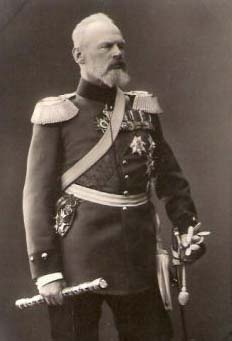
Prince Leopold of Bavaria was born in Munich, the second son of Prince Regent Luitpold of Bavaria (1821–1912) and his wife Archduchess Augusta of Austria (1825–1864). He was a Field Marshal (Generalfeldmarschall) who commanded German and Austro-Hungarian forces on the Eastern Front in World War I.

Prince Albert of Prussia was a Prussian general field marshal, Herrenmeister of the Order of Saint John from 1883 until his death, and regent of the Duchy of Brunswick from 1885, also until his death.

Wilhelm, German Crown Prince, Crown Prince of Prussia was the eldest child of the last Kaiser, Wilhelm II, German Emperor, and his consort Augusta Victoria of Schleswig-Holstein, and thus a great-grandson of Queen Victoria, and distant cousin to many British royals, such as Queen Elizabeth II and King Charles III. As Emperor Wilhelm's heir, he was the last Crown Prince of the German Empire and the Kingdom of Prussia, until the abolition of the monarchy.
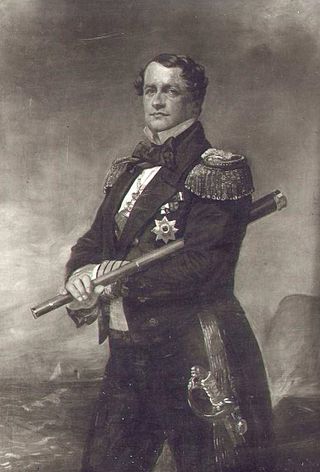
Prince Heinrich Wilhelm Adalbert of Prussia was a son of Prince Wilhelm of Prussia and Landgravine Marie Anna of Hesse-Homburg. He was a naval theorist and admiral. He was instrumental during the Revolutions of 1848 in founding the first unified German fleet, the Reichsflotte. During the 1850s he helped to establish the Prussian Navy.

Prince Adalbert Ferdinand Berengar Viktor of Prussia was the third son of Wilhelm II, German Emperor, by his first wife, Augusta Victoria of Schleswig-Holstein.

Prince Wilhelm Eitel Friedrich Christian Karl of Prussia was the second son of Emperor Wilhelm II of Germany by his first wife, Princess Augusta Viktoria of Schleswig-Holstein-Sonderburg-Augustenburg. He was born and died in Potsdam, Germany.
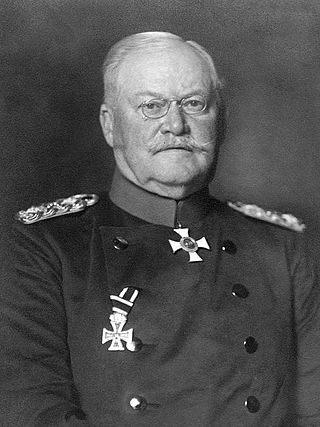
Maximilian “Max” Wilhelm Gustav Moritz von Prittwitz und Gaffron was an Imperial German general. He fought in the Austro-Prussian War, the Franco-Prussian War, and briefly in the First World War.

Karl Wilhelm Friedrich August Leopold Graf von Werder was a Prussian general.
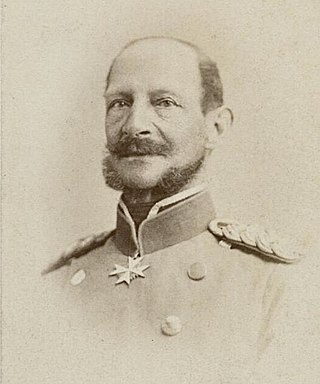
Prince Frederick Henry Albert of Prussia was the fifth son and youngest child of King Frederick William III of Prussia and Louise of Mecklenburg-Strelitz. His parents had fled to East Prussia after the occupation of Berlin by Napoleon, and Albert was born in Königsberg. Two of Albert's elder brothers were Frederick William IV, King of Prussia from 1840 till 1861, and William I, King of Prussia from 1861 to 1888 and German Emperor from 1871 until 1888.

Prince Friedrich Leopold of Prussia was a son of Prince Frederick Charles of Prussia and Princess Maria Anna of Anhalt-Dessau, married in 1854.

Prince Alfons of Bavaria was a member of the Bavarian Royal House of Wittelsbach and a General of Cavalry.

Frederick I was a German prince of the house of Ascania who ruled the Duchy of Anhalt from 1871 to 1904.

Felix Ludwig Grafvon Bothmer was a German general from Bavaria. He notably served in the Brusilov offensive of World War I.

Wilhelm Gustav Karl Bernhard von Hahnke was a Prussian Field Marshal, and Chief of the German Imperial Military Cabinet from 1888 to 1901.
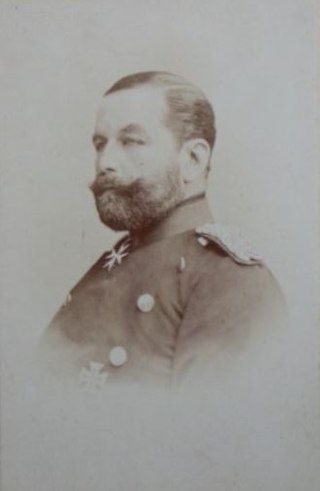
Ernst Karl Ferdinand von Prittwitz und Gaffron was a Royal Prussian Lieutenant General and Knight of Justice of the Order of Saint John.

August Wilhelm Heye was a German officer who rose to the rank of Generaloberst and became head of the Army Command within the Ministry of the Reichswehr in the Weimar Republic. One of his sons was admiral Hellmuth Heye.

Max von Bock und Polach was a Prussian officer and Field Marshal. He served in the military during the three wars of German unification under the leadership of Prime Minister Otto von Bismarck.

Gustav Emil Bernhard Bodo von Kessel was a German general who served in the Austro-Prussian War, the Franco-Prussian War and World War I.

August Ludwig Traugott Botho Graf zu Eulenburg was an officer in the Prussian, and later German armies, and official in the Prussian royal court. He was the younger brother of Count Botho zu Eulenburg, who served as Minister-President of Prussia from 1892 to 1894, and a second cousin of Philipp, Prince of Eulenburg, the close friend of Kaiser Wilhelm II.
Friedrich von Scholl, born Friedrich Ludwig Karl Ernst Wilhelm Georg Scholl, was a Colonel General in the Prussian and Imperial German armies, and adjutant in the court of Kaiser Wilhelm II. He was a relative of physicist Wilhelm Hallwachs.


















